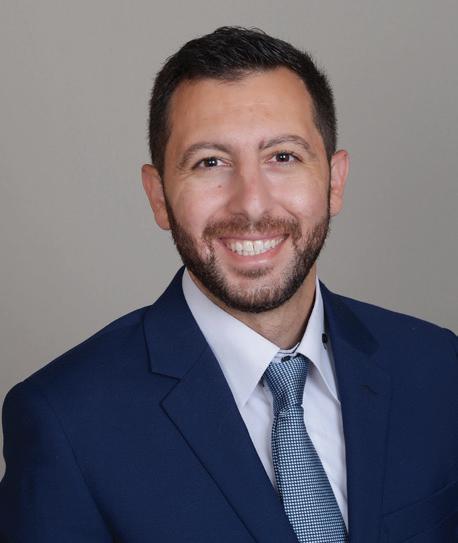
3 minute read
SCARLETT BELTRAN LEON
University of Arizona
Sbl@arizona.edu
Advertisement
Scarlett Beltran Leon is a passionate and dedicated senior undergraduate and first-generation college student studying microbiology with a minor in applied biotechnology. She is currently engaged in research and aspiring to pursue a career either as a Medical Laboratory Scientist or as a Researcher. Scarlett is currently building a strong foundation in scientific principles and exploring her interests about the microbial world. Born and raised in Tucson, AZ, Scarlett developed an early fascination with the natural world and the wonders of science. This innate curiosity, combined with her love for biology, led her to pursue a degree in microbiology at the University of Arizona. From the very beginning of her academic journey, Scarlett has demonstrated exceptional dedication and curiosity to gain more knowledge in the field. Driven by her desire to contribute to scientific research, Scarlett has actively sought out research opportunities. She joined the lab of professor Dr. Paloma Beamer at the Mel and Enid Zuckerman College of Public Health at the University of Arizona, where she has been actively involved in research projects that involve identification and quantification of environmental microbes and their relationship with childhood asthma in children in both Mexico and Southern Arizona.
Also, she is actively involved in assessing the efficacy of box fan filter air cleaners to aid with indoor air quality monitoring in homes of Diné children in the Navajo Nation to help reduce pediatric asthma disparities. Through her research, Scarlett has gained hands-on experience in various laboratory techniques with qualitative and quantitative methods that can be applied in versatile and interdisciplinary areas
⊲ PROJECT
Assessment of Vacuum’s Airflow for the Efficacy of Environmental Dust Samples Collection in Households
Children born in Southern Arizona are four times more susceptible to developing asthma compared to children born in Nogales, Mexico. The potential explanation could be the decreased exposure to protective environmental microbes due to improvements in sanitation and use of disinfectants during pregnancy and early life.
Through the Binational Early Asthma and Microbiome Study (BEAMS), the Beamer Lab assesses environmental microbial exposure through the collection of dust and water samples from participants’ households to further investigate the protective effects against the development of childhood asthma. Household dust samples are collected using vacuums; however, due to heterogeneity concerns and to maintain quality control, airflow velocity measurements were collected, analyzed and compared their performance under different environmental conditions to address inconsistencies in sample collection.
PALOMA BEAMER PhD Professor, Public Health Pbeamer@arizona.edu
Paloma I. Beamer, Ph.D., is a professor in the College of Public Health at the University of Arizona. She holds joint appointments as a professor of Chemical & Environmental Engineering and as a research scientist in the Asthma and Airway Disease Research Center. She is the Community Engagement Core Director for the Southwest Environmental Health Sciences Center (NIEHS P30). She is an environmental engineer by training and earned her BS from the University of California Berkeley and her MS and PhD from Stanford University. Her research focuses on understanding how individuals are exposed to environmental contaminants and the health risks of these exposures with a special focus on vulnerable populations, including children, lowwage immigrant workers, Native Americans and those in the US-Mexico Border Region. The ultimate goal of her work is to develop more effective interventions and policies for prevention of avoidable cases of certain diseases such as asthma.
Dr. Beamer has received a Mentored Quantitative Research Award from NIH, a Scientific Technological Achievement Award (Level I) from the US EPA, and Young Investigator Award from Yuma Friends of Arizona Health Sciences. She was selected as one of Tucson’s “40 under 40” and as an Emerging Investigator for an international journal, Environmental Science: Processes & Impact. She has served on the Board of Scientific Counselors for both US EPA and ATSDR. She is currently an Associate Editor for Environmental Health Perspectives.
Dr. Beamer is the Past President for the International Society of Exposure Science. She is a lifetime member of the Society for Hispanic Professional Engineers (SHPE) and the Society for the Advancement of Chicanos and Native Americans in Science (SACNAS).
Dr. Beamer uses field sampling, GIS, computer modeling and laboratory techniques in her research. She has led multiple studies to collect of multi-media exposure samples for metals, pesticides and VOCs with minority and rural populations. She has also developed an exposure and dose simulation model for children’s exposures to pesticides, a model that quantifies the transport of outdoor contaminants to the home environment, and a model focused on transfer of viruses via hand contacts.
Dr. Beamer is also an expert in the collection and quantification of key exposure factors aimed at improving risk assessment. She is currently funded by NIH for a to conduct a clinical trial to assess the effectiveness of a promotoras intervention at reducing exposures in small businesses like auto repair shops or beauty salons. During the COVID-19 pandemic that project has been expanded to include a “tele-promotora” program and to understand how work practices and risk perceptions have changed during the pandemic.





